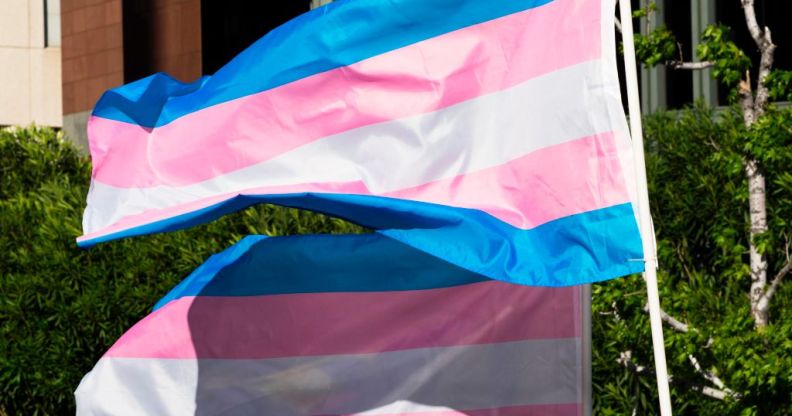Half of trans and non-binary people want to abolish legal gender categories altogether, study finds

Trans flag. (ROBYN BECK/AFP via Getty)
Half of trans and non-binary people want to abolish legal gender categories altogether, new research has found.
A University of Exeter study into potential reforms to the Gender Recognition Act, which comes after the long-delayed results of a 2018 public consultation on gender recognition were finally published on 22 September, found that half of trans and non-binary respondents wanted to abolish legal gender categories by ending the practice of recording sex at birth.
Exeter researchers exploring the potential GRA reforms by surveying trans and non-binary people found that 88 per cent were in favour of a third additional gender option for a Gender Recognition Certificate, followed by a multi-gender system (59.4 per cent) and removing the system entirely by ceasing to record sex at birth (49.6 per cent).
Introducing an additional third option was particularly popular with non-binary people, with zero non-binary people opposed to this proposal.
The 2018 Gender Recognition Act (GRA) consultation attracted more than 108,000 responses, with 80 per cent of respondents in favour of de-medicalising the process of obtaining a GRC, and three-quarters in favour of dropping a requirement for trans people to provide “evidence” of living in their chosen gender.
In a ministerial statement published alongside the consultation, equalities minister Liz Truss said that she would digitise the GRA process and reduce the fee to a “nominal” amount but signalled that broader reforms to the GRA will not go ahead.
Mollie Gascoigne, a PhD Candidate at Exeter Law School who is leading the research, said: “The government’s proposals to reduce the application fee is welcome as the current cost has posed a significant barrier to many people hoping to access legal gender recognition.
“However, to substantively increase the number of people applying for legal gender recognition and to make the system more accessible particularly for non-binary people, these findings suggest that further reform is still needed to address the current lack of non-binary gender recognition and the requirement of gender dysphoria.”
A total of 276 transgender and non-binary people completed a survey about the Gender Recognition Act 2004 and 21 non-binary people were also interviewed for the research, which is part of the Gender Recognition and Reform (GRR) Project at the University of Exeter Law School.
The research found that trans and non-binary people would be more likely to use the GRA if the need for a medical diagnosis of gender dysphoria was removed.
Half of trans people who took part in a survey opposed the gender dysphoria requirement, as did 80.7 per cent of non-binary people. Non-binary participants were more than two times more likely to report that removing the gender dysphoria requirement would make them more likely to apply for a GRC.
Respondents to the survey also said they had had poor experiences with medical professionals, found the need for a mental diagnosis stigmatising and didn’t agree that legal gender should be defined according to a medical model.

